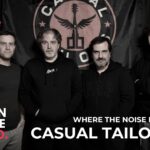Now Reading: California Congressman Kiley Receives Financials
-
01
California Congressman Kiley Receives Financials
California Congressman Kiley Receives Financials


Photo Credit: Rep. Kevin Kiley
California Rep. Kiley says he has received hundreds of financial documents from FireAid detailing the allocation of over $100 million in funds.
Last week, California Congressman Kevin Kiley released a statement acknowledging the receipt of “hundreds of documents” from FireAid detailing how it allocated the more than $100 million it raised to support wildfire victims earlier this year. The main documents itemizing the expenditures can be viewed on his website, while additional documents will be posted in the coming days.
“These documents from FireAid are an important step in providing the transparency that victims and donors deserve,” said Rep. Kiley. “I’m currently reviewing the material carefully and welcome public input as to where further scrutiny is needed.”
Documents reveal that beneficiaries of the FireAid funds thus far have ranged from the Buddhist Tzu Chi Foundation to a group making podcasts about the wildfires ($100,000 each) and nonprofit groups focusing on political advocacy for minority groups. These include the NAACP Pasadena ($100,000), the Los Angeles Black Worker Center ($250,000), My Tribe Rise ($200,000), and the CA Native Vote Project ($100,000).
Another group received $500,000 to seed burned forests with restorative fungi and bacteria, while another received $250,000 to provide mental health care for musicians. But notably absent from the financials are the names of the people whose houses burnt down in the wildfires.
“There are a lot of people in our group chats who are like, ‘What’s the FireAid money being used for?’ Because I don’t think any of us have seen any of it,” said Ben Einbinder, a community organizer who lost his Pacific Palisades home to the fires. “Some of the organizations, it would be hard to say whether they were actually using the FireAid money for wildfire relief.”
The documents arrived about a month after Representatives Kiley (R-CA) and Jim Jordan (R-OH), Chairman of the House Judiciary Committee, sent a formal request to FireAid seeking a full accounting of the nonprofit’s expenditures.
FireAid’s high-profile benefit concert held earlier this year pledged to use the $100 million proceeds to help those impacted by the devastating wildfires across Los Angeles County and beyond. But as more people have come forward saying they have yet to receive any assistance, concerns have mounted as to how the money was actually spent.
“It’s just a shitshow, to be quite honest,” added David Howard, another Palisades resident whose house burned down. “And it’s disheartening because people are suffering enough.”
“Even the artists performing on stage were telling fans and people engaging with the concert that this money is going directly to the victims,” Howard said. “But the trickle-down on that makes it so the people who need it the most haven’t seen anything.”
FireAid has been working with the Annenberg Foundation and the Goldman Sachs Donor Advised Philanthropy Fund to advise on the distribution of the funds. The audit found no inherent evidence of “misrepresentations in the solicitation of charitable funds,” “improper selection of grantees,” or “fraudulent intent.”
However, Howard says the issue isn’t the organizations that received the funds, acknowledging that many of them “probably do good work.” But there are simply “too many charities receiving the money to put it to any coordinated, meaningful use to help fire victims.”
Howard also admits that while event organizers never explicitly said the cash would go directly to victims, donors, concertgoers, and even the performers apparently didn’t get the memo.
“When an artist goes on stage telling you that the money is going to go directly to the survivors of this disaster, and that’s not true, that’s a problem,” he concluded.
























